How to Grow The Monstera Thai Constellation

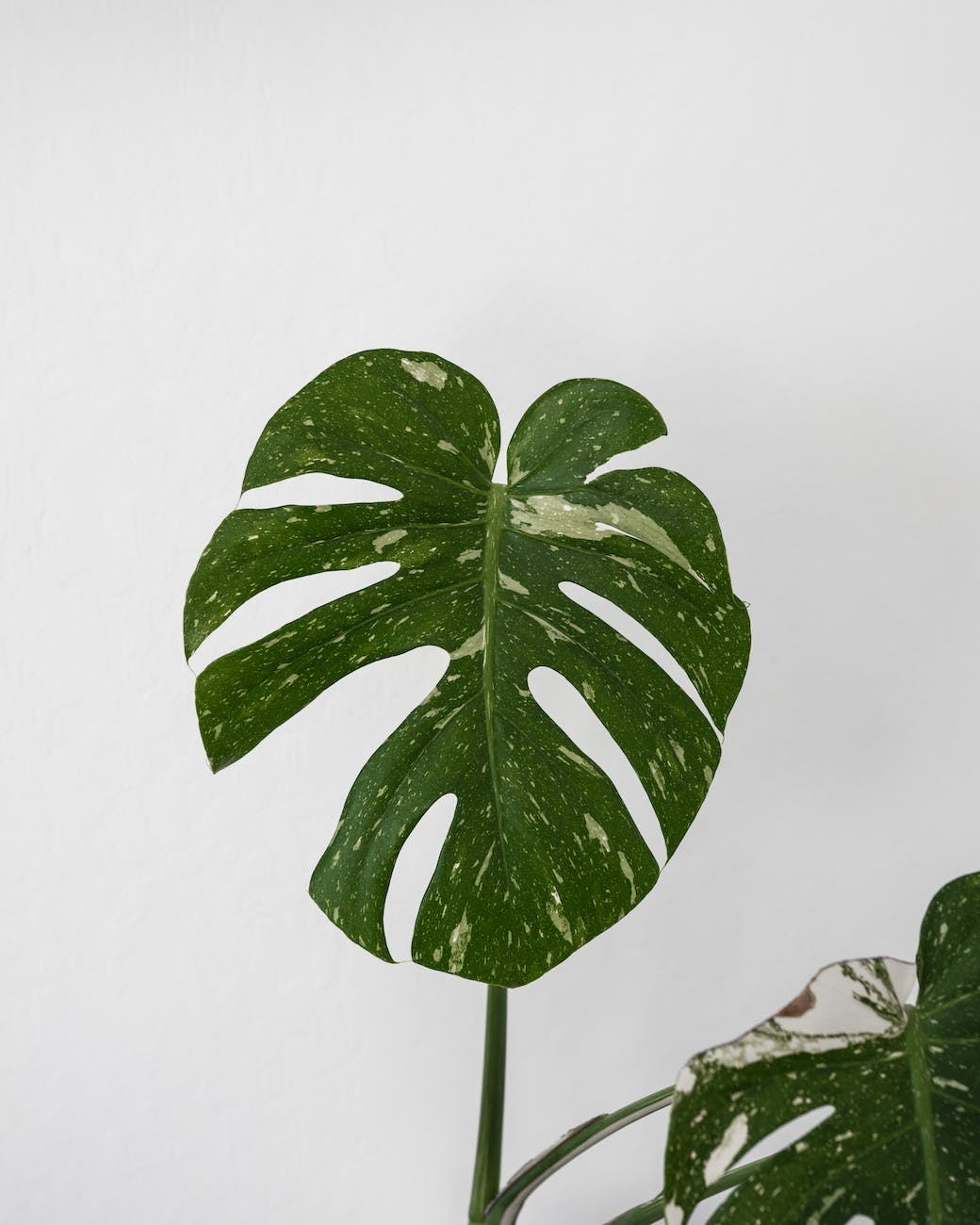
How to Grow the Philodendron Monstera Thai Constellation as a Houseplant: A Step-by-Step Guide
If you’re someone who loves houseplants, you’ve probably heard about the Philodendron Monstera Thai Constellation—or, as we like to call it, the “starry-eyed beauty” of the plant world. With its stunning variegated leaves, this plant is a showstopper that will have all your friends asking, “Where did you get that gorgeous plant?” But growing one? It’s easier than you might think! Whether you’re a seasoned plant parent or a budding enthusiast, let’s walk you through everything you need to know to care for your very own Monstera Thai Constellation.
A Little Backstory: Where Did the Monstera Thai Constellation Come From?
Before we dive into the care guide, let’s take a quick trip to the plant’s origin story. The Monstera Thai Constellation is a unique cultivar of the beloved Monstera family, which is native to Central and South America. It’s a product of the famous Monstera deliciosa, but this beauty was developed in Thailand through a hybridization process, resulting in the eye-catching variegation we see today. The plant’s glossy, heart-shaped leaves are splashed with creamy white and yellow patches, resembling a constellation (hence the name!). And while its beauty might seem like it requires expert care, don’t let that intimidate you—this Monstera thrives with just a little attention.

Step-by-Step Guide to Growing Your Monstera Thai Constellation
Pick the Right Spot: Light is Everything
First things first—location, location, location! Monstera Thai Constellation loves bright, indirect light. Direct sunlight? Not so much! While a little sun in the morning won’t hurt, avoid placing your plant in harsh, direct sunlight because it can scorch those beautiful variegated leaves. Think of it as the Monstera’s personal “spa day” where it gets lots of light but not the full sunburn treatment.
If you don’t have a spot with the ideal light, no worries—this plant is a bit of a “light chameleon” and will adapt to lower light conditions, though it will grow slower. So, if you’re not planning on throwing a dance party with your light levels, it’s still manageable!
Watering: Keep it Moist, but Not Wet
Ah, watering—the eternal struggle of all plant lovers. Here’s the deal with your Monstera Thai Constellation: it likes to be kept slightly moist, but it absolutely hates sitting in water. No soggy feet allowed! During the growing season (spring and summer), you should water when the top 2-3 inches of soil feel dry to the touch. In winter, when the plant is resting, you can let it dry out a little more before watering.
A good rule of thumb? Stick your finger into the soil—if it’s dry, it’s time to water. If it feels damp, hold off a little longer. Oh, and make sure your pot has drainage holes! If it doesn’t, we recommend you get a new one. Your Monstera’s roots will thank you!
Temperature and Humidity: A Warm, Tropical Haven
Monstera Thai Constellation is a tropical plant, so it likes warmth and humidity. The ideal temperature range is between 65-85°F (18-29°C), but they can tolerate a little variation. Just avoid placing them in spots that are too drafty or too chilly (think near windows or air conditioners in the winter). They also appreciate humidity, so if your home is on the dry side, consider misting the leaves occasionally or investing in a humidifier. Aim for humidity levels of around 60% for happy, thriving leaves.
Pro Tip: If you notice the leaves starting to curl or yellowing at the edges, it might be a sign that it’s a little too dry. Time for some extra misting!
Soil: A Well-Draining Mix
Monstera Thai Constellation isn’t picky about soil, but it does love good drainage. A well-draining potting mix is essential to keep your plant’s roots happy and healthy. A good mix would include peat, perlite, and some orchid bark to ensure water doesn’t linger too long around the roots.
You can also make your own DIY soil blend with 2 parts potting soil, 1 part perlite, and 1 part orchid bark. This will create a light, airy mix that allows your Monstera’s roots to grow and breathe properly.
Fertilizing: Feed Your Star
Just like humans, your Monstera needs its nutrients! During the growing season (spring and summer), feed it with a balanced liquid fertilizer every 4-6 weeks. You can dilute the fertilizer to half strength if you’re worried about overdoing it—your Monstera Thai Constellation will appreciate it either way.
In fall and winter, when the plant isn’t actively growing, you can cut back on fertilizing to once every 6-8 weeks or stop altogether. It’s like giving the plant a little winter break to recharge.
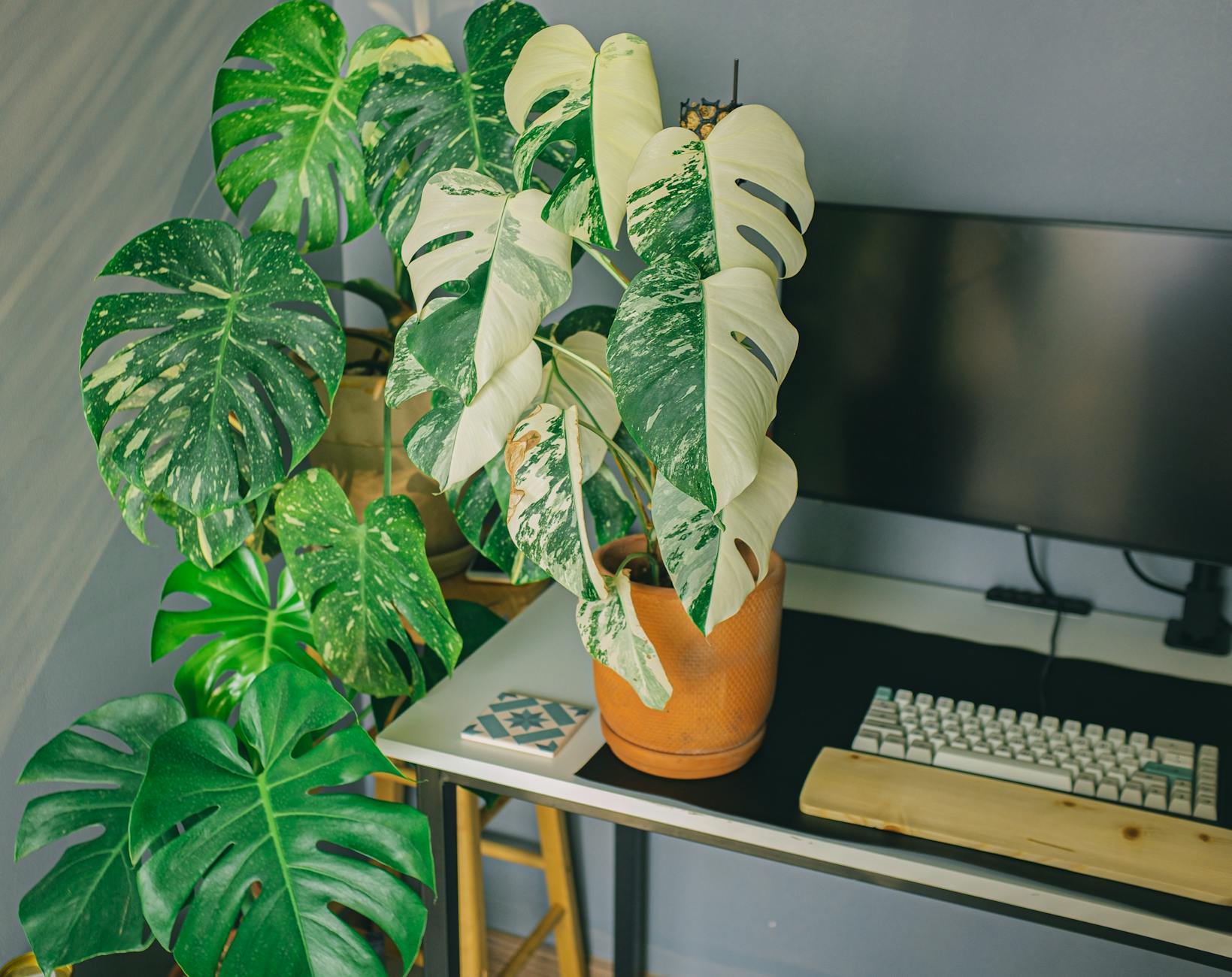
Repotting: Growing Room for Your Beauty
Monstera Thai Constellation isn’t one to stay small for long, so you’ll need to repot it every 1-2 years as it grows. Look for a pot that’s 1-2 inches larger in diameter than its current pot. Spring is the ideal time to repot, as your plant is just waking up from its winter slumber.
Be sure to carefully loosen the roots and check for any that are rotting. If you find any brown or mushy roots, trim them with sterile scissors. And don’t forget to fill the new pot with fresh, well-draining soil!
Pruning and Support: Give It Something to Climb
Your Monstera Thai Constellation loves to climb, and it will do so if given the right support. Consider adding a moss pole or trellis to help guide its growth upward. Not only will this keep your plant looking sleek and stylish, but it will also encourage larger, more stunning leaves (yes, the bigger the better).
Pruning is optional, but if you want to keep the plant at a manageable size or encourage fuller growth, feel free to trim back any leggy or overgrown vines. Just make sure you use clean, sharp scissors to avoid damaging the plant.

Pests and Problems: Keep an Eye Out
While Monstera Thai Constellation is generally pest-resistant, it’s always a good idea to keep an eye out for common houseplant pests like spider mites, mealybugs, or aphids. If you spot any, a quick wash with a mixture of water and mild soap or neem oil will do the trick.
Yellowing leaves can sometimes be a sign of overwatering, underwatering, or too little light—so keep an eye on those factors and adjust accordingly.
Extra Tips for Thriving Thai Constellations
- Air Circulation: Monstera Thai Constellation appreciates good air circulation, so try to avoid placing it in overly stuffy corners. If you can, give it some space to breathe.
- Leaf Cleaning: Gently wipe the leaves with a damp cloth to remove dust and keep those beautiful variegations sparkling. Plus, it helps the plant absorb more light.

You’ve Got This!
Growing a Monstera Thai Constellation may seem a little intimidating at first, but with a little love, patience, and attention, you can enjoy this stunning beauty in your home for years to come. Whether you’re a novice or a plant expert, remember that this lovely Monstera thrives when treated with the right amount of care. So, get ready to impress all your friends with your gorgeous new leafy star—because you absolutely can do this!
To learn how to grow the green Monstera Deliciosa read this post!
Here are some additional tips:
- Repot your Thai Constellation every two to three years, or when it outgrows its pot.
- Prune your Thai Constellation as needed when it gets too tall.
- Avoid placing your Thai Constellation near drafts or heaters.
- Add a moss pole or flat wood board for your plant to climb.
- Plants with white variegation can get brown spots on the white areas. The white part of the foliage does not photosynthesize and therefore makes no energy for the plant. Because of this it tends to die sooner than the green areas
With consistent care, your Monstera Thai Constellation will thrive and produce beautiful leaves for years to come.
Happy Gardening
Want More?
Houseplants are gorgeous living home decor. It is worthwhile learning how to properly care for them.
IF YOU LIKE THIS POST
You might also like these:
- How to properly water your houseplants
- Best soil to tropical houseplants
- Best Indoor Trailing Houseplants
We’d love to hang out with you on our social channels. You can subscribe to our blog and find us on Facebook, Youtube, Instagram and Pinterest! Feel free to reach out if you have any plant questions!
DISCLOSURE
This blog post may contain affiliate links. Which means if you click on a link and go on to buy the product I recommend, I may get a small commission at no extra cost to you.
Thank you for your support. It means the world to us!
The Thrifted Planter
Ciearra is a gardener and houseplant enthusiast of over 10 years! She has been growing indoors and outdoors. Supplying food for her family and beautifying her home with annuals, perennials and houseplants! Ciearra is passionate about sharing her knowledge of plant care with anyone who needs help or a quick plant growth tip! When she’s not blogging you can find her tending to her chickens, dogs and hanging out with her family

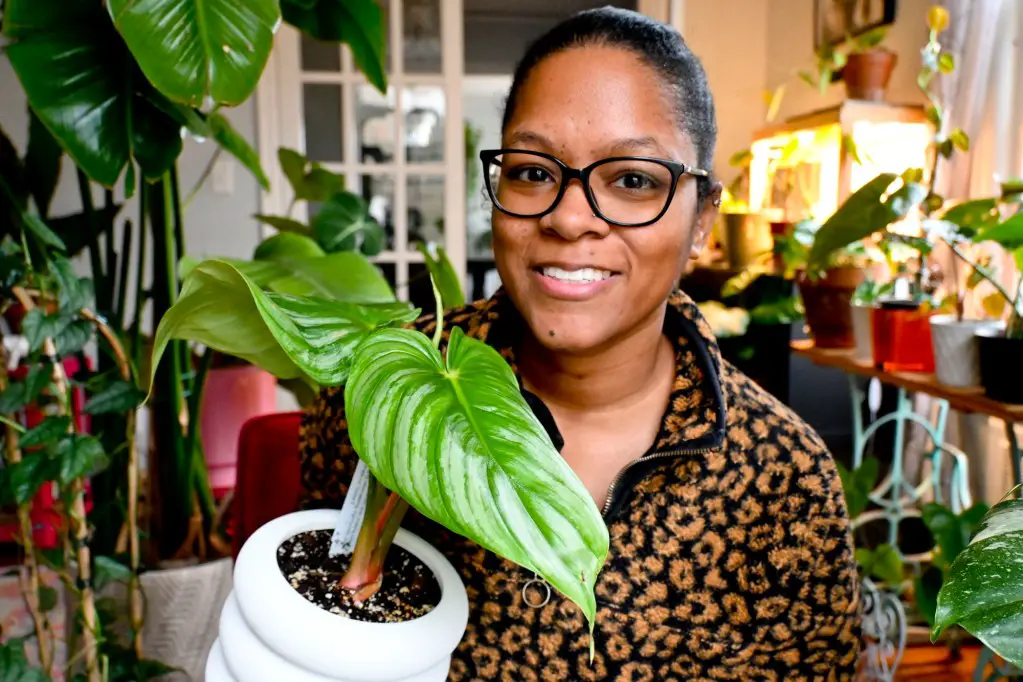



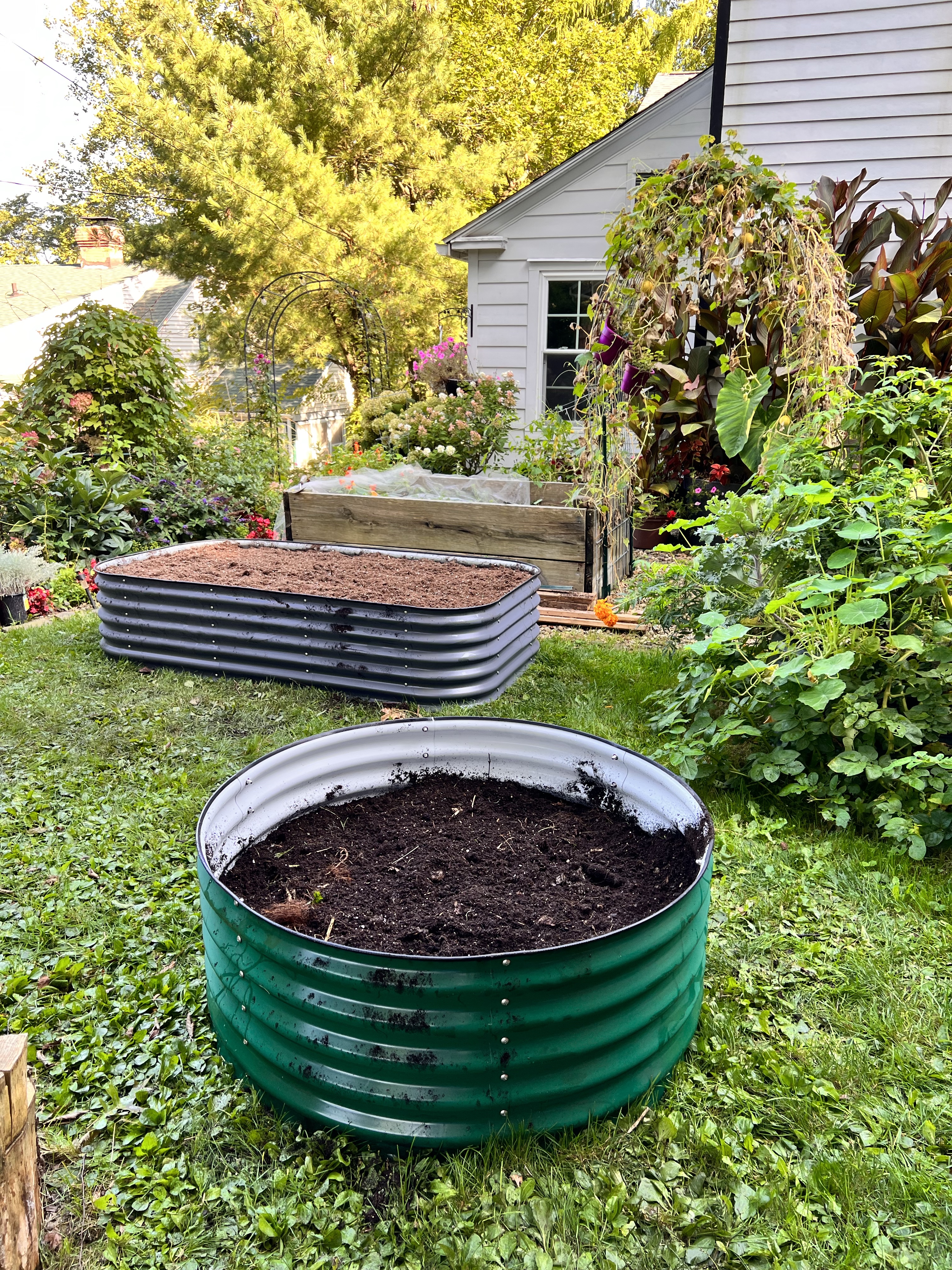




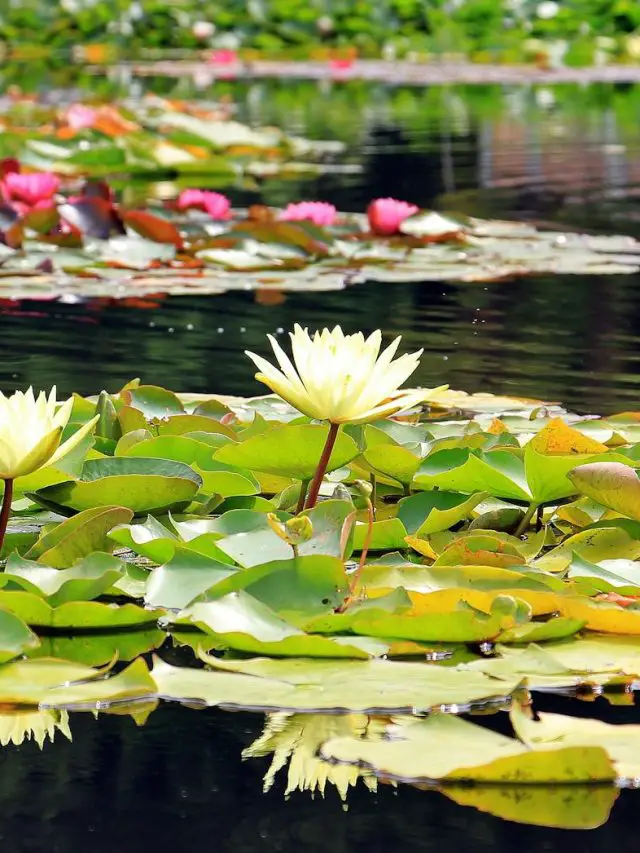
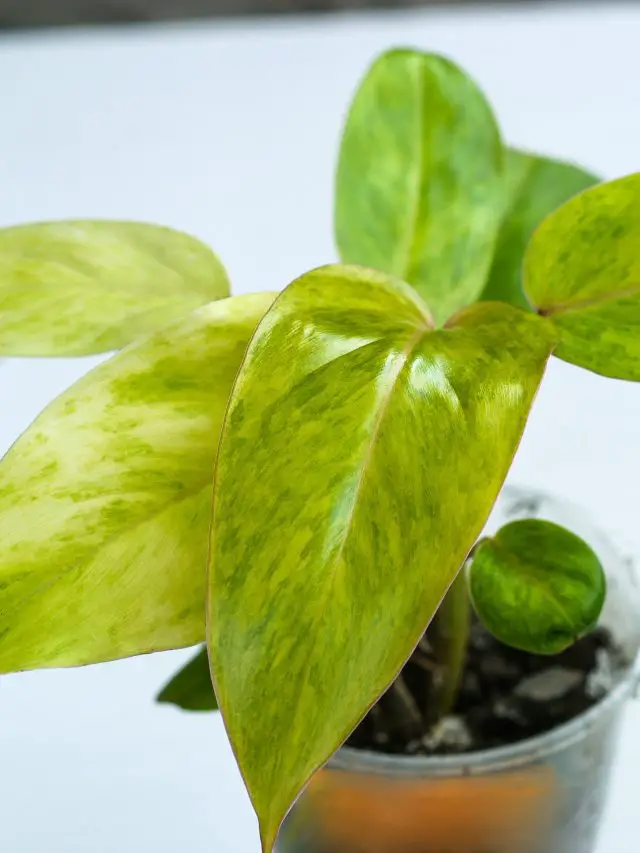

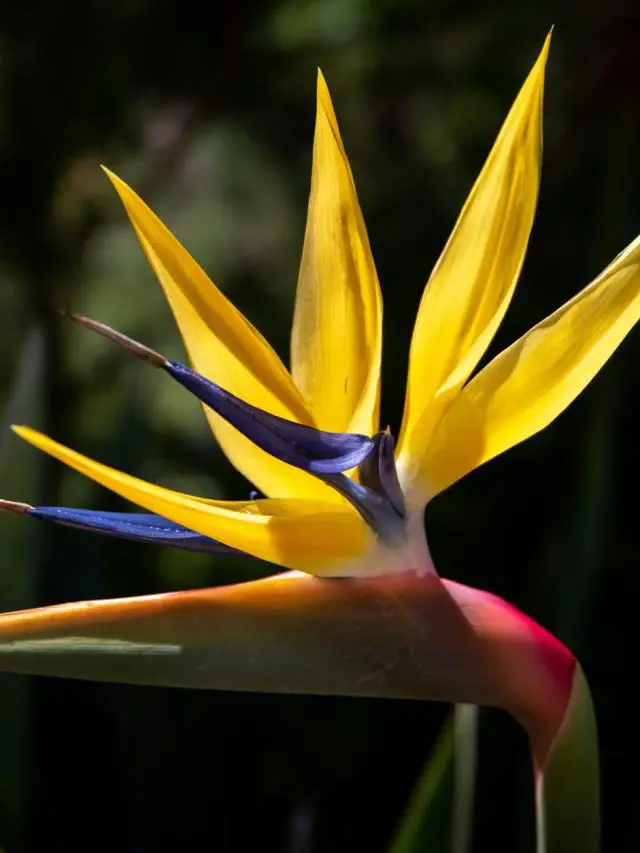
[…] If you love the Philodendron Gloriosum then you’ll love the Monstera Thai Constellation! Learn about the Thai Con Here! […]
[…] deliciosa ‘Thai Constellation‘ (Variegated Swiss Cheese […]
[…] How to Grow Monstera Thai Constellation […]
[…] How to Grow a Monstera Thai Constellation […]